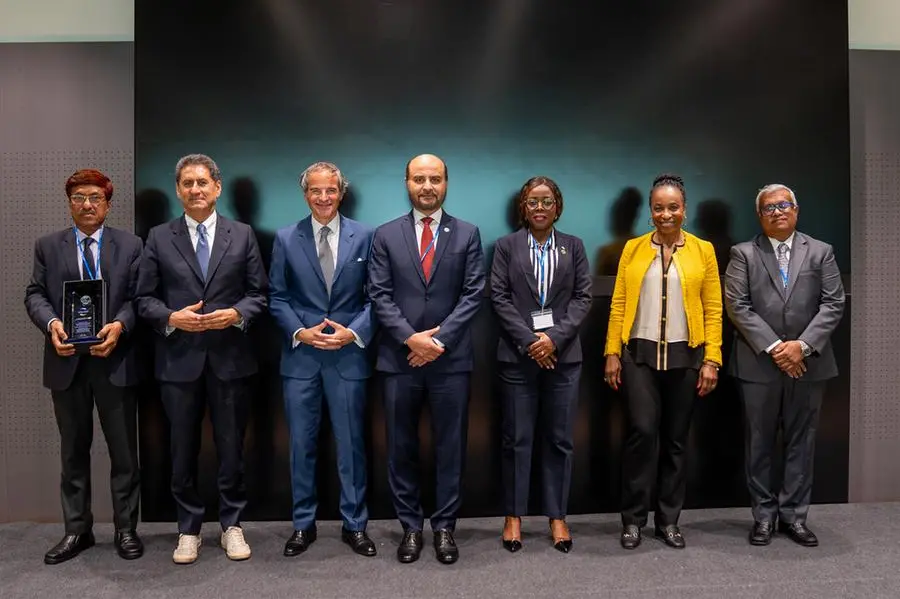PHOTO
Climate Solutions Week kicks off at the Headquarters of the OPEC Fund for International Development (the OPEC Fund) in Vienna. An OPEC Fund initiative, the event is bringing together global development and financing partners, experts, policy makers and stakeholders to develop actionable strategies for achieving a just and sustainable climate transition.
Opening the Climate Solutions Week, OPEC Fund President Abdulhamid Alkhalifa said: “Climate work is part of the OPEC Fund’s DNA as a development institution whose mandate is South-South cooperation and whose vision is sustainable development. We are committed to taking climate impact into account for each project we finance and aim to drive momentum on climate action together with key partners.”
Climate Solutions Week focuses on four key themes: Clean cooking, energy transition, carbon markets and nature based solutions. In more than 30 sessions over five days, participants will jointly assess new approaches and strengthen partnerships.
Participating as a guest speaker on opening day, the Austrian Federal Minister for Climate Action, Leonore Gewessler, said: “COP28 in Dubai was a major success in our fight for a sustainable future – and still we are facing huge challenges when it comes to addressing the climate crisis. These challenges call for ambitious, fast and science-based solutions. We need to transition away from fossil fuels and deploy renewables as fast as possible. Gatherings like the Climate Solutions Week are an important opportunity to keep the conversation going and to prepare for progress at COP29 this year.”
The COP28 Action Agenda centered on fast-tracking a just and orderly energy transition, fixing climate finance, focusing on people, nature, lives and livelihoods, and fostering inclusivity to reach net zero emissions by 2050, in keeping with the science. COP28’s outcome document - the UAE consensus - was signed by parties representing 197 countries.
OPEC Fund member country Gabon was represented at the event by its Minister of Environment, Climate and Human-Wildlife Conflict Arcadie Svetlana Minguengui Ndomba epse N'zoma. In her remarks she said: “Gabon is committed to a policy aimed at combating energy poverty and climate change by diversifying its economy, developing renewable energies and improving energy efficiency. Our approach involves shared responsibility, a firm commitment to equity and environmental justice, the enhancement of natural capital and, above all, taking into account our specific characteristics as a developing country.”
Monday’s opening session for Climate Solutions Week features keynotes by Rafael Grossi, Director General of the International Atomic Energy Agency (IAEA), Francesco La Camera, Director-General of the International Renewable Energy Agency (IRENA) and Fatou Haidara, Deputy to the Director General and the Managing Director of the Directorate for Global Partnerships and External Relations, United Nations Industrial Development Organization (UNIDO).
The OPEC Fund also presented its annual development award to Dhaka Ahsania Mission (DAM), a non-governmental organization based in the capital of Bangladesh. DAM supports underprivileged women and smallholder farmers in the South Asian country. The OPEC Fund award, dedicated to gender equality and climate action for the year 2023, was launched in 2006 and includes prize money of US$100,000.
The second part of the Climate Solutions Week on Thursday and Friday will be dedicated to the Nature Solutions Finance Hub First Partners Forum. This facility was inaugurated by the Asian Development Bank (ADB) and the OPEC Fund at UN climate change conference COP28 in Dubai in December 2023 to scale up the flow of finance into conserving and protecting nature and biodiversity loss in the Asia & Pacific region. Together with finance and technical partners, ADB aims to catalyze at least US$2 billion by 2030 from public and private sources for nature-based solutions.
Other notable participants in the Climate Solutions Week include Fareed Yasseen , Climate Envoy and Advisor to the Prime Minister of Iraq; Warren Evans, Climate Envoy, Office of the President, ADB; and Charis Lypiridis, Fund Manager Climate Change Group, World Bank. Speakers will explore a range of topics such as “Private Fund Mobilization for Climate Adaptation and Mitigation,” “Integration Climate Action to Development Finance,” and “The Climate Mitigation Gap.”
About the OPEC Fund
The OPEC Fund for International Development (the OPEC Fund) is the only globally mandated development institution that provides financing from member countries to non-member countries exclusively. The organization works in cooperation with developing country partners and the international development community to stimulate economic growth and social progress in low- and middle-income countries around the world. The OPEC Fund was established in 1976 with a distinct purpose: to drive development, strengthen communities and empower people. Our work is people-centered, focusing on financing projects that meet essential needs, such as food, energy, infrastructure, employment (particularly relating to MSMEs), clean water and sanitation, healthcare and education. To date, the OPEC Fund has committed about US$27 billion to development projects in over 125 countries with an estimated total project cost of more than US$200 billion. The OPEC Fund is rated AA+/Outlook Stable by Fitch and AA+, Outlook Stable by S&P. Our vision is a world where sustainable development is a reality for all.




















